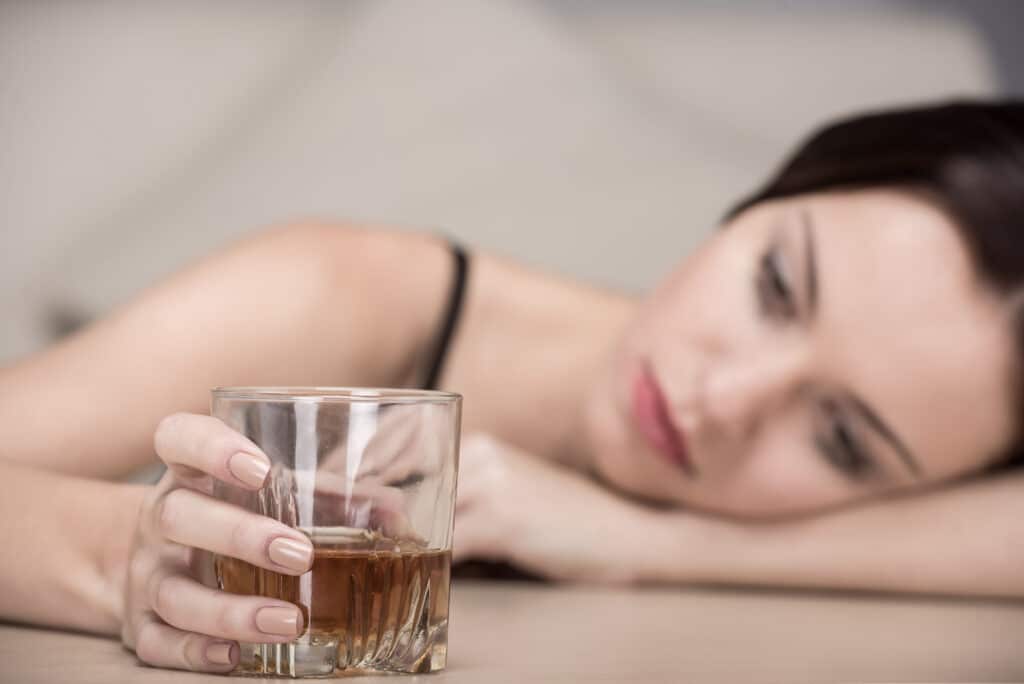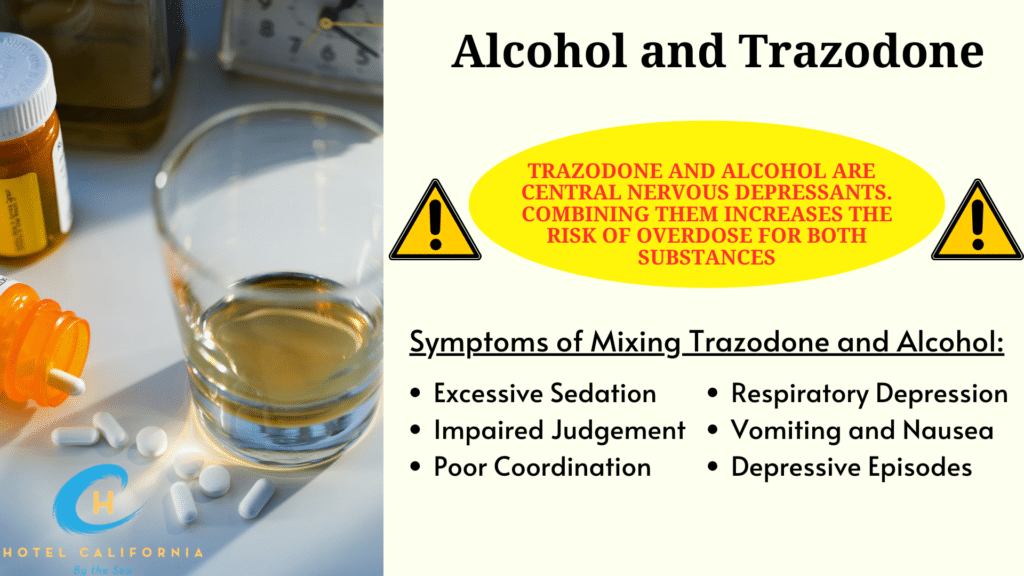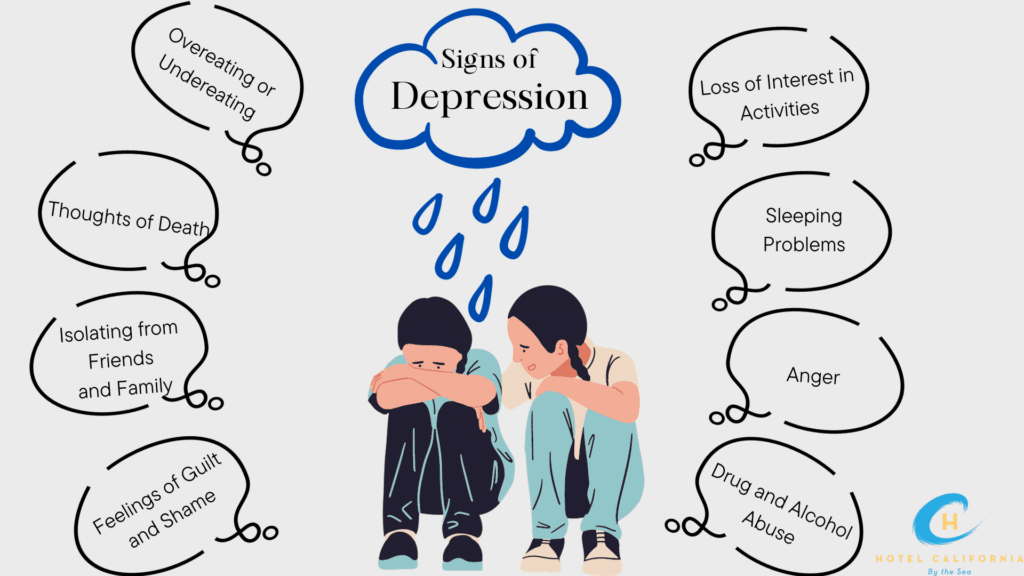Polysubstance Use: Trazodone and Alcohol
Major depressive disorder is a common yet serious mental health condition in which prescription medications are often used to treat. Trazodone, a FDA-approved antidepressant is a medication with sedative properties used to treat symptoms of depression. Trazodone produces sensations of relaxation and drowsiness that can also be used off-label for treating anxiety and sleep conditions. Trazodone is generally considered part of a long-term medication treatment plan. Because of this, it can result in dependence, addiction and the risk of overdose. This is especially more likely when trazodone and alcohol are combined.

Trazodone is in the class of antidepressants called a serotonin antagonist and reuptake inhibitor (SARI). In 1981, the FDA approved trazodone under the brand name Desyrel for treating major depressive disorder. Today trazodone is popular under the name Oleptro and prescribed to treat sleep disorders like insomnia, anxiety disorders and symptoms of unipolar depression.
Can you overdose on Trazodone
It is possible to overdose on trazodone. According to the American Association of Poison Control Centers, only an estimated 1% of users overdose on trazodone. It is not a common occurrence and is not considered life-threatening compared to other mood-altering substance medications. Trazodone cannot produce feelings of euphoria or high so users rarely develop a psychological dependence on the antidepressant. However, medication toxicity is possible when users attempt to accelerate feelings of relief from depression symptoms by taking too much and more than the recommended dose of the medication, says Dr. Jason Kellogg, Medical Director at Hotel California by the Sea.
The maximum recommended dose of trazodone for the treatment of depressive symptoms is about 200 mg per day. The max recommended dose of trazadone for the treatment of insomnia and sleep disorders is about 25 mg per day. Going 2-3mg over the recommended max dosage leads to a high risk for respiratory failure. Going 4-5mg over the recommended max dosage can cause severe central nervous system depression and lead to coma.
Symptoms of overdose include:
- Agitation
- Confusion
- Twitching muscles
- Rapid or irregular heart rate and other abnormal heart rhythms or arrhythmias
- QT prolongation – a heart rhythm issue that can cause chaotic or abnormal heartbeats. Symptoms include chest pounding, shortness of breath and severe bleeding issues
- Low blood sodium levels – nausea, headache and hallucinations
- Diarrhea
- Shivering and shaking
- High fever
- Seizure
- Unconsciousness
- Withdrawal symptoms when usage has suddenly stopped
Overdose from trazodone isn’t likely to occur when being abused on its own. There is a much higher chance of overdose when it is combined with other central nervous system sedatives such as alcohol.

Trazodone and Alcohol
Trazodone and alcohol both affect the central nervous system and the activity of the GABA neurotransmitter system in the brain. However, they work in opposing directions. The combination of the two substances can lead to unpredictable effects on the user’s mood, thoughts and behavior.
Alcohol works by increasing dopamine release leading to feelings of pleasure and reward. Trazodone works by reducing dopamine activity leading to feelings of sedation and tiredness. Trazodone increases serotonin activity in the brain to help regulate mood and anxiety. Alcohol also affects serotonin through the release of neurotransmitters to temporarily improve mood. However, chronic alcohol abuse can lead to decreased serotonin activity, which then produces feelings of depression and anxiety.
The polydrug use of both trazodone and alcohol can produce adverse side effects of both substances. Alcohol increases the risk of sleepiness and dizziness from trazodone. It also prolongs the potency of trazodone in the system leading to the risk of medication toxicity.
The effects of mixing alcohol and trazodone can result in:
- Increased sedation
- Impaired cognitive functions make it challenging to speak or walk normally
- Respiratory depression, which suppresses the breathing system
- Increased risk of overdose
- Worsening symptoms of depression and anxiety
- Liver damage – the liver is responsible for filtering out toxins from the body and can be overwhelmed when having to process both alcohol and trazodone
How does Trazodone work?
Trazodone is not a controlled substance and is generally not considered to be an addictive substance when used as prescribed. This also means physicians are not limited in how much they can prescribe compared to more potent and habit-forming medications such as Lunesta and Ambien. It is an inexpensive generic medication that is covered by most insurances making it more available and accessible to the masses.
The antidepressant is also commonly prescribed for off-label uses in treating symptoms of anxiety, Alzheimer’s disease, substance use disorders, bulimia and fibromyalgia. It can also be used to treat PTSD.
There are many other types of anti-depressant medications prescribed by physicians. Selective serotonin reuptake inhibitors (SSRI) include medications like Zoloft and Lexapro. Serotonin norepinephrine reuptake inhibitor (SNRI) includes medications like Effexor ER and Cymbalta. Norepinephrine and dopamine reuptake inhibitors (NDRI) is an antidepressant such as Wellbutrin SR. Tricycle antidepressants (TCA) include medications such as Pamelor and Remeron.
When prescribed for treating sleep conditions such as insomnia, trazodone can start working within 30 minutes. When prescribed for the treatment of depression, symptom relief may not begin until one or two weeks out. At most, it can take an estimated four weeks for the patient to experience the benefits of the drug.
Trazodone works by reducing levels of neurotransmitters such as serotonin and dopamine. Serotonin regulates parts of the body such as the internal clock for wakefulness and sleep, mood, appetite and memory. Dopamine releases affect the reward system in the body. When reducing the production and transportation of these chemical neurotransmitters in the brain, the drug produces feelings of lethargy. This is why this drug is often prescribed to help users sleep and relax from their intense feelings of depression and anxiety.

Side Effects of Trazodone
- Drowsiness
- Dizziness
- Fatigue
- Tingling or numbness in the arms and legs
- Blurred vision – changes in vision or swelling and redness in the eye
- Disorientation and confusion
- Vertigo
- New or worsening Anxiety and Depression
- Muscle aches
- Low blood pressure
- Irregular heartbeat
- Increased risk of suicidal thoughts and behaviors
- Insomnia
- Panic attacks
- Aggressive or violent behaviors
- Mania
- Unusual changes in mood and behavior
- Withdrawal symptoms due to dependence on the medication
- Antidepressant discontinuation syndrome – symptoms that are similar to that of depression and anxiety that appear when medication is abruptly stopped
Another serious symptom of Trazodone addiction and overdose is the development of serotonin syndrome. This occurs when high levels of serotonin accumulate in the body. It is the overstimulation of central and peripheral receptors. Serotonin syndrome is most often caused when certain antidepressants are taken concurrently with other drugs that affect the production of serotonin levels in the body. It can develop as soon as 2 hours after the initial dose or as long as 24 hours after.
Trazodone can stay in your system for around two and a half days. The half-life of the medication is about 4-12 hours. It takes an estimated five half-lives for the body to eliminate the drug.
Check Your Insurance Coverage for FREE
Find out if your insurance covers addiction treatment in minutes. We accept most insurance!
Major Depressive Disorder
Trazodone is prescribed to treat symptoms of depression. Major depressive disorder can be described as intense and long-lasting feelings of sadness, emptiness or loss of joy. To be officially diagnosed, these feelings are consistently present for at least 2 weeks. This mental health condition affects weight changes, mood changes, problems with sleeping, loss of appetite and loss of interest in activities once loved.
Depression is the imbalance in brain neurotransmitters. There are varying types of depression.
- Major depression – symptoms of depressed mood or loss of interest for 2 weeks that interfere with daily activities
- Persistent depressive disorder – dysthymia or dysthymic disorder consisting of less severe symptoms of depression that last much longer. It can usually last for up to 2 years
- Perinatal depression – occurs during or after pregnancy
- Seasonal affective disorder – a form of depression that comes and goes with the seasons. The symptoms typically develop in the late fall and early winter and go away in spring and summer
- Depression with symptoms of psychosis – This is a severe form of depression in which a person experiences psychosis symptoms such as delusions or hallucinations
Reach out to Hotel California by the Sea
We specialize in treating addiction and other co-occurring disorders, such as PTSD. Our Admissions specialists are available to walk you through the best options for treating your addiction.
Treatment for Trazodone Abuse and Co-occurring Mental Health Conditions
Addiction to antidepressants like trazodone, requires the experience and resources of a professional behavior health treatment program. Our substance use disorder treatment program focuses on helping clients overcome their addiction as well as treating any co-occurring mental health conditions such as depression. Hotel California by the Sea offers a complete system of care when it comes to addiction treatment.
Our treatment centers offer detox, residential and outpatient programs. Specialized therapies offered include cognitive behavior therapy, marriage and family therapy and EMDR therapy. Our addiction treatment centers specialize in treating co-occurring mental health disorders such as depression, anxiety and PTSD. We believe in creating a well-rounded treatment plan. This means addressing the physical, emotional and psychological aspects of any addiction. Hotel California by the Sea is committed to providing the tools and resources for clients to overcome their addiction.
References:
https://www.ncbi.nlm.nih.gov/books/NBK470560/
https://www.hazeldenbettyford.org/articles/trazodone
https://www.healthline.com/health/drugs/trazodone-oral-tablet
https://www.goodrx.com/trazodone/what-is
https://www.medicalnewstoday.com/articles/drugs-trazodone-tablet
https://www.addictioncenter.com/stimulants/antidepressants/trazodone-addiction-abuse/
https://addictionresource.com/drugs/trazodone/overdose/
https://www.theedgetreatment.com/mixing-trazodone-and-alcohol-drinking-and-this-ssri-is-a-bad-idea/
